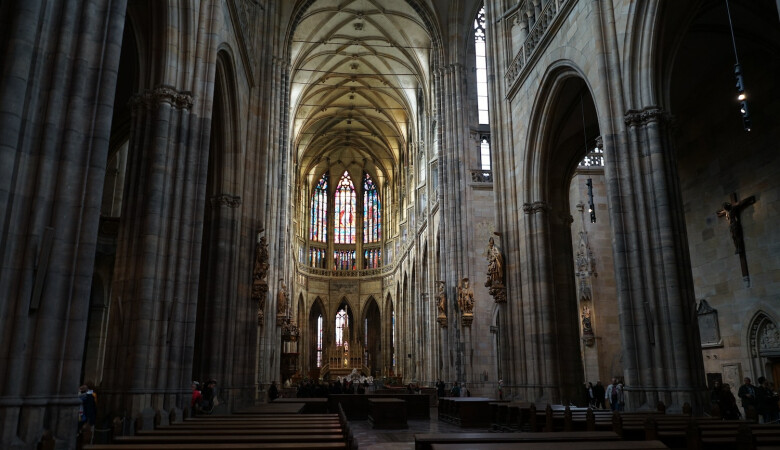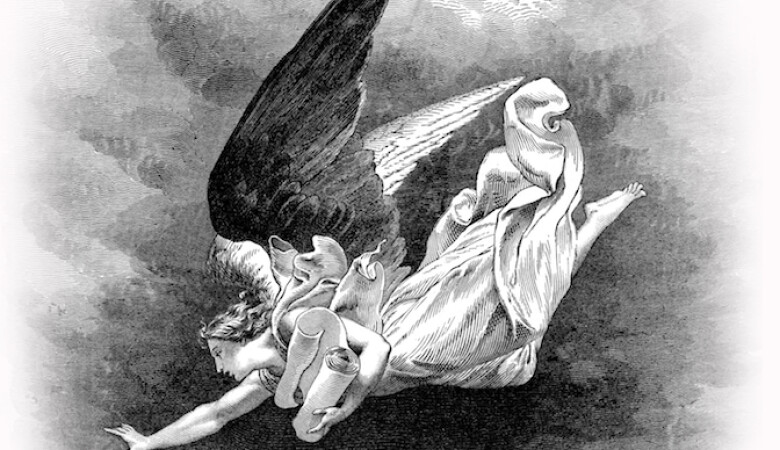The Spirit and the Bride Say, “Come!” (Revelation Sermon 48 of 49)
May 20, 2018 | Andy Davis
Revelation 22:17
Evangelism
sermon transcript
Introduction
I was raised in a Roman Catholic family in eastern Massachusetts. I attended church faithfully and enjoyed it. I was an altar boy, and I learned accurately about Jesus — that he was the son of God, son of Mary, and part of the Trinity. One thing I did not learn in the Catholic church is how a sinner like me could be made right with God, and so I was lost. I went to church every Sunday, but I lived a lost life throughout the week. When I went off to college, I stopped going to church. I was too busy on Saturday nights and Sunday mornings to go to church, and it was not in my heart.
I joined the Sigma Chi fraternity at MIT. One of our summer responsibilities was fraternity evangelism. That has nothing to do with the Gospel. We had to recruit incoming freshmen to join the fraternity, just as I had been the year before, who would agree to live in the house on Beacon Street in Boston to replace those who had graduated. If we did not, our rent would increase. I had to make five recruitment phone calls that summer to incoming freshmen in eastern Massachusetts, to invite them to summer parties hosted by the fraternity. I hated making those phone calls because the freshman were so cynical — they received calls from many fraternities besides ours. I made my five calls and then crumpled up the list and threw it in the trash. I was done. Then I felt guilty, thinking, “What kind of attitude is that? I will make six phone calls. I will go above and beyond the call of duty.”
The sixth guy, Steve Chamberlain, led me to Christ. Just as I took the list out of the trash can, to some degree God took me up out of Hell and into Heaven. (Steve lived in Topsfield, where I would later become a pastor; he was mentored by Mark Dever, the pastor of Capitol Hill Baptist Church and the founder of the 9Marks ministry, whom I first met when he came to see me the week I was converted.) It took a year of evangelistic effort on Steve’s part. I treated him very badly. I was rude to him. At first, when he started talking to me about the Gospel, I was interested, and then little by little, I became offended. I did not like how I felt when he was around, so I did not want to eat with him or spend time with him. Eventually, God broke through. I did not come to faith in Christ the first time I heard the Gospel; it took a year or so, but eventually the Lord by His sovereign grace brought me. I think often of Steve Chamberlain’s faithfulness.
In the 36 or so years since that time, only a handful of people have evangelized me — not counting the Jehovah’s Witnesses that knock on our door — with the true Gospel. I was always thankful for those few, but I realize evangelism is hard for Christians. I have struggled with this my entire Christian life. I am not naturally outgoing; I do not naturally enjoy meeting strangers. It is a challenge. Satan has put up obstacles in our culture that hinder us from meeting strangers, talking comfortably to people that we do not know.
This morning we will talk about evangelism and the responsibility that we have to share the Gospel with people around us here in the area. We will focus on Revelation 22:17: “The Spirit and the bride say, ‘Come!’ Let the one who hears say, ‘Come!’ And let the one who is thirsty come, and the one who desires the water of life drink freely.” We will immerse ourselves in the mysterious calling of the Gospel, the responsibility we have to be involved in the Gospel ministry. We will learn more about evangelism, of calling thirsty sinners to faith in Christ.
Every day, we are surrounded in this Triangle region by unchurched, unsaved people. This area is exploding with people pouring in from all over the country, and from many places all over the world. People find the area a desirable place to live. There are jobs in the high tech industry, in pharmaceutical research, excellent hospitals, excellent universities. There is a pleasant, comfortable style and level of life that people find attractive. The climate is better here than in Boston, Massachusetts, I assure you — I do not miss the winters at all. This is one of the fastest growing metropolitan regions in the country. Most of those who come to the area are unchurched, unsaved. We have a responsibility to share the Gospel and we are strategically located in downtown Durham to do precisely that.
The folks who are pouring in here that are lost, outside of Christ, are desperately seeking something. They are thirsty for meaning and purpose in life, and they are drinking from, in a sense, the cup of the great whore of Babylon from Revelation 17, enjoying material pleasures and advantages of life. From Revelation 18, we know that is what is going on, but they do not know. Drinking from that cup only makes them more thirsty. It is an addictive cycle, like quenching thirst with salt water. They are never satisfied, trying to find joy and pleasure and satisfaction and meaning in life, but we know they will never find it from this world system. If they are to find it, they will find it in Christ and his Gospel. It is our privilege, our responsibility, to call on them to come and drink from Christ.
I tend to combine today’s text with Isaiah 55:1-2: “Come, all you who are thirsty, come to the waters; and you who have no money, come, buy and eat! Come, buy wine and milk without money and without cost. Why spend money on what is not bread, and your labor on what does not satisfy? Listen, listen to me, and eat what is good, and your soul will delight in the richest of fare.” We are strategically poised to invite thirsty people to come and drink, to find deep, rich, full satisfaction without money, without cost, to reach hundreds and even thousands with the Gospel, and to see dozens and dozens more baptized here in this church than we have ever seen before. That is my desire and the desire of all the elders.
We want to see the Lord open doors all around us, and we need to walk through those doors. Jesus said in Revelation 3 to the church in Philadelphia, “See, I have placed before you an open door, which no one can shut.” When He opens a door, no one can shut it. When he shuts it, no one can open it. He has that kind of sovereign power. This sermon is specifically about our cooperation with the Holy Spirit of God in evangelism. We are called on to be partners in a mysterious way with the Holy Spirit in this work of Gospel outreach.
God’s Final Invitation
Final Invitation to Find Salvation
This is God’s final invitation in Scripture to sinners to find salvation in Christ. We come to the end of the Bible — the final book, the final chapter, the final section, and whether we have God’s final invitation to sinners to come and find salvation in Christ.
This invitation is like the parable that Jesus told of a king who wanted to put on a wedding banquet for his son. Matthew 22:2-5 says: “The kingdom of heaven is like a king who prepared a wedding banquet for his son. He sent his servants to those who had been invited to the banquet to tell them to come, but they refused to come. Then he sent some more servants and said, ‘Tell those who have been invited that I have prepared my dinner: My oxen and fattened cattle have been butchered, and everything is ready. Come to the wedding banquet.’ But they paid no attention and went off — one to his field, another to his business.” God has been beckoning to lost people throughout the generations to come to the wedding banquet, but people do not come; they turn away in disinterest.
A number of years ago at Christmas time, I encountered Hans Christian Andersen’s short story called The Little Match Girl, a story of a very poor girl whose harsh domineering father sends her out in the freezing cold weather on Christmas Eve to sell matches. No one is out because of the cold, so she cannot get anyone to buy her matches. Outside a rich home, she looks through the window and sees a banquet laid out. The window is steamed with aromas of the roast goose and lavish food on the banquet table, but she is on the outside looking in. No one sees her or invites her in. Instead, she lights one of her matches. As she looks at the glow, she imagines herself sitting at the banquet table until that match burns out. One by one, she lights all of her matches until they are all gone. She is found the next morning frozen to death.
The parable of the wedding banquet has a different bent. Here, the happy King spreads a feast and yearns for people to come in and eat freely without money, without cost, to find their souls richly satisfied with the richest of fare. But he cannot get anyone to pay attention. Luke 14:18-20 is a parallel account: “But they all alike began to make excuses. The first said, ‘I have just bought a field, and I must go and see it. Please excuse me.’ Another said, ‘I have just bought five yoke of oxen, and I’m on my way to try them out. Please excuse me.’ Still another said, ‘I just got married, so I can't come.’” They are jut making excuses, unlike the little match girl, who is desperate that someone would invite her so that she can come in and get warm and be fed, but no one will invite her or open the door and welcome her.
In this case, the tragic figure is the king. He wants people to come and celebrate with his son who is getting married but no one will come. In that parable, the king sends more and more messengers to compel people. Luke 14:23 says, “Then the master told his servant, ‘Go out to the roads and country lanes and compel them to come in, so that my house will be full.’” Day after day, God beckons to sinners, inviting them to a banquet. Romans 10:21 says, “All day long I have held out my hands to a disobedient and obstinate people.” That is the picture that I have of evangelism.
While There Is Time
The people who have moved to this area drive by churches daily. Perhaps they believe that life will continue on and on, that they have limitless time. Maybe they have some attraction to church, having had good experiences in the past or at least curiosity, but they do not stop. They drive by these churches as they go to work, or to shop, or on their way to the golf course.
They see the steadiness of God’s gracious invitation day after day, week after week, year after year. The church seems solid, as though it will be there forever, giving the consistent message of salvation in Jesus. But I tell you that there will come a time when it will all come to an end. No book teaches that so plainly as the book of Revelation. It will come to an end. Every individual who is not in the final generation will die. It is appointed to us to die once and after that to face judgment. So as they goes through life surrounded like they are in America with many opportunities to hear the Gospel, there will come a last chance to hear the Gospel, to hear of the grace of God and Christ Jesus.
Centuries ago, the Baptist preacher John Bunyan, who wrote Pilgrim’s Progress, preached a sermon based on two texts in the New Testament: the parable of the rich man and Lazarus, and the parable of the rich fool. In Luke 12:16-21, Jesus tells of the rich fool whose land produced an abundant harvest such that he could not store it. “Then he said, ‘This is what I will do: I will tear down my barns and will build bigger ones, and there I will store up all my grain and my goods. Then I will say to myself, “You have plenty of good things laid up for many years. Take it easy. Eat, drink, and be merry!” ’ But God said to him, ‘You fool! This very night your life will be required of you. Then who will own what you have accumulated?’” He also talked about how the rich man languished in Hell, asking for an act of mercy from Lazarus. The sermon was titled “A Few Sighs from Hell.”
Bunyan said, “The man, instead of thinking of death, thought how he might make his barns bigger. But, in the midst of his business in the world, he lost his soul before he was aware, supposing that death had been many years off. But God said unto him, ‘You fool, you trouble yourself about things of this life, you put off the thoughts of departing this world, when this night your soul shall be taken from you.’ ... And hence it is again, that you have some in your towns and cities that are so suddenly taken away, some from visiting the ale-houses, others from frequenting the whore-houses, others from playing and gaming, others from the cares and covetous desires after this world, unlooked for as by themselves or their companions. Suddenly it is all over! It all comes to an end! And we can well imagine one of the groans, and sighs and laments that will come from many damned people: ‘I always thought I would have more time! I always thought I would have one more chance! I always figured I would be able to time it, that when I had my last chance to hear the invitation to free grace in Christ, that I would seize it.’”
That is true of every individual. Life will come to an end. This is also true of the human race — the world is moving ahead to the end. There was an Alpha day and there will be an Omega day, a final day.
This is God’s last invitation in Scripture: “The Spirit and the bride say, ‘Come!’ Let the one who hears say, ‘Come!’ And let the one who is thirsty come, and the one who desires the water of life drink freely.”This is a call to redeem the time. For anyone here today in an unconverted state, this is an opportunity for you to cross over from death to life. 2 Corinthians 6:2 says, “‘In the time of my favor I heard you, and in the day of salvation I helped you.’ I tell you, now is the time of God's favor, now is the day of salvation.”
Whoever Is Thirsty
“The Spirit and the bride say, ‘Come!’ And let him who hears say, ‘Come!’ Whoever is thirsty, let him come; and whoever wishes, let him take the free gift of the water of life.” It is an invitation to come drink the free gift of the water of life. Revelation 22:1-2 tells us what that is: “Then the angel showed me the river of the water of life, as clear as crystal, flowing from the throne of God and of the Lamb down the middle of the great street of the city. On each side of the river stood the tree of life, bearing twelve crops of fruit, yielding its fruit every month. And the leaves of the tree are for the healing of the nations.” It is an invitation to come and drink the water of eternal life, to come and drink and live forever.
Are you thirsty? Has sin left you parched and empty? Come and drink the waters of the river of life flowing from Christ. This is specifically an invitation to come to Jesus Christ as your Savior. John 6:35 says, “Then Jesus declared, ‘I am the bread of life. He who comes to me will never go hungry, and he who believes in me will never be thirsty.’” That is a typical Jewish parallelism, Jewish poetry, to say the same thing twice in slightly different ways. Jesus did the same.
To come to Jesus is to believe in him. If you do, you will never be hungry. You will never be thirsty. To come to the waters is to believe in Jesus, to trust in him for the forgiveness of your sins.
The Spirit and the Bride
Cooperation and Collaboration
The Spirit and the bride are both saying, “Come, come to Jesus!” This is a marvelous verse on the cooperation between the Spirit and the Bride, who, we learned in Revelation 21, is the church of Jesus Christ, the people of God in this world. The Spirit and the Bride — the church — are together inviting lost sinners to come and drink from Christ and find life. Both the Spirit and the church, therefore, are instrumental in bringing lost sinners to faith in Christ. They both have a role to play. The Spirit calls sinners to come, and the bride calls sinners to come, and even those who are thirsty and who are coming and drinking are inviting other thirsty people to come and drink.
The Spirit’s General Invitation
The Spirit invites, generally, universally, the human race to come. He does this by means of Scripture, the Bible that he has inspired. The Holy Spirit is the third person of the Trinity, God the Father, God the Son, and God the Holy Spirit. The Son and the Spirit inspired the Scriptures, the written Word of God, which has the power to make you wise for salvation through faith in Christ Jesus (2 Timothy 3:15). In the Scripture, we have the Gospel of Jesus Christ.
Romans 1:16-17 says, “I am not ashamed of the gospel, because it is the power of God for the salvation of everyone who believes: first for the Jew, then for the Gentile. For in the gospel, the righteousness of God is revealed — a righteousness that is by faith from first to last, just as it is written, ‘The righteous will live by faith.’” That is a summary of the whole book of Romans. The Holy Spirit was in the Apostle Paul when he wrote those words. Through the Book of Romans, the Holy Spirit is saying to the human race, “Come, come to Christ and find forgiveness.”
Later in that same book, we have the glowing heart of the gospel, in Romans 3:21-24: “…a righteousness from God, apart from law, has been made known, to which the Law and the Prophets testify [the law and the prophets together talk about this salvation in the Old Testament]. This righteousness from God comes through faith in Jesus Christ to all who believe. There is no difference, for all have sinned and fall short of the glory of God, and are justified [forgiven of their sins, made right in the sight of God] freely by his grace through the redemption that came by Christ Jesus.” Jesus shed His blood on the cross in our place that we might have forgiveness of sins. As Paul wrote, the law and the prophets testify to this gospel, even though they lived centuries before Jesus. The Holy Spirit was in the prophets, and he was showing them things about the future, things they would have no other way of knowing.
1 Peter 1:10-12 says, “Concerning this salvation, the prophets, who spoke of the grace that was to come to you, searched intently and with the greatest care, trying to find out the time and circumstances to which the Spirit of Christ in them was pointing when he predicted the sufferings of Christ and the glories that would follow. [The Spirit told Isaiah, Jeremiah, Ezekiel and Daniel that centuries later, a savior would come to suffer and die, and be raised on the third day, and that repentance and forgiveness of sins would be preached in His name to all nations, beginning in Jerusalem. They did not understand, but Peter says:] It was revealed to them that they were not serving themselves but you, when they spoke of the things that have now been told you by those who have preached the gospel to you by the Holy Spirit sent from heaven. Even angels long to look into these things.” The Holy Spirit was in the prophets and the apostles in the writing of the Word. Through the Scriptures, the Spirit says “Come” generally to the human race.
The Holy Spirit wrote the Old Testament through the prophets. He also wrote the New Testament through the apostles. After the day of Pentecost, the Holy Spirit came into them, and then they wrote the New Testament. They were the eyewitnesses, which is the basis of the New Testament. Jesus told them it would happen in John 14:26: “But the Counselor, the Holy Spirit, whom the Father will send in my name, will teach you [apostles] all things and will remind you of everything I have said to you.”
The Holy Spirit reminded Peter, John, James, Andrew, and all of the apostles who were eyewitnesses, of all that he said and did. On the basis of that, we have Matthew, Mark, Luke, and John, and the entire New Testament. The Father and the Son together sent the Spirit in the world to complete the redemptive work of God. This is amazing teaching. Without the powerful working of the Spirit, not a single sinner would ever have been saved. Jesus’ atoning work on the cross would have saved no one were it not for the work of the Holy Spirit. I am not speaking blasphemy or heresy; it is true.
The blood of Christ was shed, but it had to be applied, just as the Jews of old had to paint the blood on the doorpost so that when the angel of death saw the blood, he passed over that house. It is the Holy Spirit’s glory to apply the blood of Christ to sinners like you and me. He moves and works, and so I owe my salvation as much to the work of the Holy Spirit as I do to the work of Jesus Christ on the cross and to the Father for the plan. It is a cooperative effort. By the Spirit, the Gospel goes out into all the world; by the Spirit, Jesus becomes famous in every generation.
When I was growing up, almost everybody had heard of the Beatles, an English rock group. Some of you younger ones have never heard of them, making my point. As every generation passes, they become less and less famous. One member of the group, John Lennon, once said, “We are more famous than Jesus.” Perhaps at that moment they were as close as anyone has ever been. But it is not true now — a new generation of babies has been born that never heard of John Lennon. There is no zealous, powerful, omnipotent God ensuring in every generation that John Lennon and the Beatles will be famous. All flesh is grass, and all their glories fade like the flower of the field. They become less and less famous with every passing year.
But Jesus somehow is famous in every generation. How is that? It is the work of the Holy Spirit. The Spirit is making Jesus famous all over the world by moving the bride to say, “Come.” By the Spirit, the church is moved to preach the Gospel. Jesus said to the apostles and through them to the whole church, “You will receive power when the Holy Spirit comes on you, and you'll be my witnesses in Jerusalem, and in all Judea and Samaria, and to the ends of the Earth.”
The Spirit compels witness, and that is the very thing I am counting on now for you. All of us feel inadequate as evangelists. We need to remind ourselves that it is only when the power of the Spirit comes on us that we can overcome our weaknesses and our selfishness and actually share the Gospel with people. This is a point of application: Rely on the Holy Spirit. I know you know what I am calling you to do, and I understand — it is hard for me too. Ask God to give you power through the Holy Spirit to be His witness today. Ask for the opportunity, and when that moment comes, ask Him to make you alert to it. Then ask Him to help you get over your sinful weakness, to enable you to speak for Jesus. He will, by the power of the Spirit. The Spirit compels witness. He has been doing this in every generation.
One of my great missionary heroes is Hudson Taylor, a missionary to China. When he had finished his first tour of duty on the coast, as all the missionaries were, he returned to England and Scotland for some furlough, for recuperation and recruitment of new missionaries. While there, he had a vision. He saw a map of the inner provinces, the inland regions of China, and he knew that there were teeming hundreds of millions of people who had never heard of Jesus in those inner regions, while all of the western missionaries were on the coastline. He called it the accusing map.
He wrote this about his experience attending a service in England: “On Sunday, June 25, 1865, unable to bear the sight of a congregation of a thousand or more Christian people rejoicing in their own security while millions were perishing for lack of knowledge, I wandered out on the sands alone, in great spiritual agony, and there the Lord conquered my unbelief, and I surrendered myself to God for this service. I told Him that all the responsibility as to issues and consequences must rest with Him; that as His servant, it was mine to obey and follow Him— His to direct, to care for, and to guide those who might labor with me. Need I say that peace at once flowed into my burdened heart.”
Where did the burden come from? Where did the unutterable agony come from as he was wandering on the sand? Does that not come from the Holy Spirit of God? The Spirit puts a burden, a compulsion, on our hearts. Ask God to give you a burden, a burning compulsion to reach individuals or a group of people that you are equipped to reach. The Apostle Paul said in Acts 20:22-24, “And now, compelled by the Spirit, I am going to Jerusalem, not knowing what will happen to me there. I only know that in every city the Holy Spirit warns me that prison and hardships are facing me. However, I consider my life worth nothing to me, if only I may finish the race and complete the task the Lord Jesus has given me — the task of testifying to the gospel of God's grace.”
Consider the beginning of that passage: “And now, compelled by the Spirit, I am going to Jerusalem…” The compulsion, the burden, from the Spirit of God, where little by little you consider your life worth nothing to you if only you can do the work He has given you to do — do you yearn for that to happen in our church? Do you yearn that more and more church members would have a compulsion by the Spirit toward some aspect of outreach? It does not have to be the same for everybody. We get different callings.
The Spirit says, “Come.”
The Bride’s General Invitation
The Bride says, “Come,” as well. The bride is the church. There is a collaborative, joint effort between the Spirit and the church. John 15:26-27 teaches this: “When the Counselor comes, whom I will send to you from the Father, the Spirit of truth [the Holy Spirit] who goes out from the Father, he will testify about me. And you also [this is a partnership] must testify, for you have been with me from the beginning.” The Spirit and the bride together say, “Come.”
We are to preach the Gospel to anyone and everyone, indiscriminately, because we cannot tell who are the elect, chosen before the foundation of the world. It is true and biblical, but we do not know who they are. Our task is to be willing to suffer for unconverted elect people, to see them cross over from darkness to light, from death to life. Adoniram Judson was called to be a missionary to Burma. He went to one locality where he and his partner gave out 500 missionary tracts, and as a result, they saw one Burmese person baptized. That is so convicting.
I yearn for the 500 tracts. I want the one, but I want us to be the kind of church that will give out 499 and see the 500th person converted. I would love to be that persistent in evangelism where I am faithful, leaving the results to God, willing to have 499 failures to see somebody come to Christ. Our job is to continue to share Christ with as many people as we can, no matter how many or few respond.
George Whitefield was one of the most powerful open-air preachers in all of church history, probably the most effective ever. He preached to tens and tens of thousands of people and saw hundreds and hundreds and hundreds, if not thousands and thousands, converted. He traveled by horse-drawn carriage from place to place to place in England and Scotland and in the colonies before the American Revolution. He said something that stuck with me. He said, “God forbid that I should travel with anyone one-quarter of an hour and not share the Gospel with them.”
On our way back from a conference in Louisville, Joel Harford and I flew from Louisville to Atlanta, and from Atlanta to RDU. In both cases, I had seat A and Joel had seat C. On the first leg, the guy in seat B, named Isaiah, was a 19-year-old baseball player from a college in the Louisville area, from a mild Baptist background, who had not been to church in years. On the second leg, our seatmate, named Joe, lived in Wake Forest. He was a nominal Roman Catholic and also had not been to church in years. Joel and I did not pound on them. We gave them a break. One asked if he could get by to use the restroom, and I wondered if that was to get away. But Joel and I agreed that we had done what we needed to do. We had a great time. Isaiah asked good questions. He was taking a World Religions class, and was reading whether the Gospel of Thomas should be included in the Bible. God put us there to have that conversation. At the end, Joe thanked us for the things we talked about. He asked questions and kept the conversation going until we landed. God gives opportunities along the way.
The Spirit’s Effective Calling
The Spirit alone has the power to cause a person to come. No sinner has or will ever resist the Holy Spirit’s mysterious, effective call, his effectual calling, or irresistible grace. When the Spirit moves, Ezekiel 36:26-27 says, “I will give you a new heart and put a new spirit in you; I will remove from you your heart of stone and give you a heart of flesh. And I will put my Spirit in you and move you to follow my decrees and be careful to keep my laws.” This includes the command to repent and believe in Jesus. The Holy Spirit alone can do that. We cannot.
In John 3:3-8, “Jesus declared, ‘I tell you the truth, no one can see the kingdom of God unless he is born again.’ ‘How can a man be born when he is old?’ Nicodemus asked. ‘Surely he cannot enter a second time into his mother's womb to be born!’ Jesus answered, ‘I tell you the truth, no one can enter the kingdom of God unless he is born of water and the Spirit. Flesh gives birth to flesh, but the Spirit gives birth to spirit. You should not be surprised at my saying, ‘You must be born again.’ The wind blows wherever it pleases. You hear its sound, but you cannot tell where it comes from or where it is going. So it is with everyone born of the Spirit.’” When the Spirit says, “Come,” he gives you supernatural power, like Jesus when He raised Lazarus from the dead. You come alive and see the glory of God in the face of Christ, and you are born again. The Spirit can do that.
Whoever Wishes May Come
When that happens, the text says, “Whoever is thirsty, let him come, and whoever wishes, whoever wills, let him come.” That looks like free will, right in the Bible. However, without the Holy Spirit calling on your dead heart, you will never be willing to come. When he gives you life and moves in you, you will see at last just how delicious that water of life flowing from Jesus is. You want it, so he comes.
John 6:37 says, “All that the Father gives me will come to me.” The Holy Spirit draws. Our job is to share the Gospel. Romans 10:13-15 says, “Everyone who calls on the name of the Lord will be saved. How, then, can they call on the one they have not believed in? And how can they believe in the one of whom they have not heard? And how can they hear without someone preaching to them? And how can they preach unless they are sent? As it is written, ‘How beautiful are the feet of those who bring good news!’”
Be Fishers of People
Understanding Our Responsibility and the Gospel Message
We have a partnership responsibility. Let Christ make you a fisher of people. He said to his disciples, “Follow me and I will make you fishers of men.” Our job is to learn the skill of fishing. Some of you love fishing, but I will never want to learn real fishing like trout fishing, bass fishing, deep sea fishing. I do not like either the process or the product, so I will not do that. I understand it is very relaxing and peaceful. I have heard you say if the fish do not disturb us, we will have a great time.
This fishing is different. We have a responsibility to learn the skill of fishing for people, to learn how to draw them skillfully, to answer their questions, to deal with arguments that Satan puts in their minds. God has committed to us the ministry of reconciliation. We are positioned like Esther, “for such a time as this,” to share the gospel.
Our first task is to understand the Gospel message and to proclaim it boldly. Will Metzger, in his book To Tell the Truth, begins with this illustration: “Picture this: a runner in ancient Greece arrives exhausted before the emperor. Gasping, he blurts out, ‘My lord, I was given an urgent message, but... I am afraid I have forgotten what it was!’” That is bad. We must remember and understand the message we are sharing.
First and foremost, we need to understand what the Gospel is. You have a bulletin insert, a basic four-part outline of the Gospel: God, man, (humanity), Christ and response. It may sound familiar — Campus Crusade for Christ and others have used similar outlines, such as the Four Spiritual Laws, over the years.
First, God: He is the creator of everything. In the beginning, God created the heavens and the earth. He created all things, and because he created all things, He is King and ruler over everything. This is his universe. We are in it. As King, He is the law giver. He has given laws to the human race by which we are to live — the Ten Commandments and the two Great Commandments. As King, He is also judge. He will evaluate us on Judgment Day for how we have lived our lives.
Second, man: we are created in the image of God by God the Creator. We were created to have a relationship with and to serve God the King, but we have broken that relationship through our sins. We have violated God’s laws; we are rebellious against God the King, and therefore, we are under condemnation by God the Judge. Physical death is promised. Eternal death in hell is threatened.
Third, Christ: Christ is the fourth office — God the Savior. “Jesus” means “Salvation is from the Lord.” God sent his Son into the world. He was fully human, born of a virgin, and also fully God. He had no human father. His was a supernatural birth, He lived a sinless life, and He did miracles — he walked on water, he fed the 5000, he stilled the storm with his words, he raised dead people, he healed sick people. There was nothing he could not do, but he especially came to die a substitutionary death on the cross. His blood shed on the cross pays the death penalty for our sin — for the wages of sin is death — and Jesus paid that penalty in our place. But God did not leave Him in the grave. On the third day, God raised him from the grave, and He is alive and will live forever more. He ascended to Heaven, and sat at God’s right hand. He rules over Heaven and earth, and some day he will return to judge both living and dead people.
Fourth, response: Therefore, we ourselves, having heard that, we must repent of our sins and believe the good news, that forgiveness of sins is available in Jesus Christ. You must not try to work for it or earn your salvation, but instead trust in the grace of God, for by grace are you saved through faith, and this not of yourselves, is a gift of God, not by works, so that no one could boast [Ephesians 2]. Do not wait because you do not know if you will be alive tomorrow. Repent and believe the good news today.
You do not need to do exactly that every time you evangelize, but it should be your goal to say those things in some form to the lost people around you, a pattern or a form of the Gospel message.
A Varied Menu of Evangelistic Opportunities
How will we evangelize? On the back of the blue sheet, you will see a menu of ideas in two categories, different ways of looking at your life. First, who can you share the Gospel with? Second, what can you do to engage with them?
Who?
Who will we evangelize? Here are six levels of concentric circles of people around you:
Family: The most effective evangelism in the world is parent-child evangelism. Be faithful to pour the Gospel into your children’s lives. Lead them to an early faith in Christ. Also, extended family — God often uses saved children to lead their parents to Christ. Maybe you have unsaved brothers or sisters or other relatives — cousins, nieces, nephews, other family members.
Unsaved friends: Build friendships with non-Christians.
Neighbors: When I was growing up, neighbors were out and about most days. The other day, I went on a two-hour bike ride. It was a little hot, but I did not see a single pedestrian the whole time — nobody working in the yard or taking a walk. It was strange. Everybody was inside on electronic entertainment or simply staying cool. Somehow we must meet the people who live near us.
Acquaintances: Meet people in your daily routine, at a convenience store, supermarket, on an airplane.
Co-workers: Workplace evangelism is one of the most effective strategies. You interact every day with non-Christians — co-workers, your boss, a subordinate — hunt opportunities to share Christian things. Invite people to church, to your home; use hospitality.
Total strangers: Go to a park nearby and sit down on a bench, or meet someone walking a dog or watching their kids play or strolling a baby. Have a conversation.
How?
First, look to develop a long-term loving relationship. Be a human being, get to know people, ask questions. On flights, I always ask questions. Where are you headed? (Ultimately, where are you headed?) Have conversations in the workplace. Be interested in others’ lives, Let it flow naturally from love.
Be hospitable. Open your home. Make it a home base. Invite people over.
Participate in ministering to felt needs — mercy ministry. The international connections ministry is one such opportunity. ESL is a big felt need. People come from China and other places, as refugees or visiting scholars. Most want to learn English better but it is an opportunity to share the Gospel. Serve at the health fair, the Caring Center, Habitat for Humanity, other places that meet non-Christians’ felt needs.
Volunteer for events like VBS, coming soon. We get to interact with dozens of non-Christian parents who send their kids to VBS. That is a big ministry. I urge you to consider serving if you are able. The health fair is an event as well as a felt-need ministry. Plan an event at your home, such as a Christmas party or a 4th of July cookout. Invite people to attend.
Engage in shared interests, like running, biking, pottery, kids’ sports or music.
That is a basic beginning menu of strategies to help you find ways to interact with people.
I urge this church to be involved in a culture of evangelism. Let us develop as a church, caring for each other and getting involved. If you have an event at your home, involve other church members. Do not do it alone.
I have two books here, I’ve Got Tell the Truth by Will Metzger, and Evangelism by Mack Stiles — 10 of each. I am offering them free of charge to 20 people. If you take the book, you do not have to pay for it, but promise you will read it and when you are done, pass it off to another church member to read.
A Call for Extraordinary Prayer for Durham
Praying Together for Our Community
We need to give ourselves to prayer for this, to ask God to help us with our evangelistic endeavors. To that end, I offer three options on prayer. First, this is our last home fellowship of the year; we will talk about evangelism in our groups and have chances to pray, but I would urge home fellowships through the summer to get together and pray for evangelistic fruit in each other’s lives and in our church.
Second, every week, a small group of us meets at 8:30 a.m. on Sundays to pray. Since you are coming to church anyway, all you need to do is adjust your schedule to arrive a little earlier to join us. We will pray for evangelistic fruitfulness. That might be the most convenient way to pray about this with others.
Third, starting this week, for four weeks, I will pray on Wednesday mornings at 6:00 a.m. I have done this in the past. Again, we will pray for our church to be fruitful in evangelism. If you would like to sacrifice a little sleep, we will meet here in the sanctuary to pray for God to bless our evangelistic outreach.
Closing Prayer
Father, thank you for the time we have had to study. Thank you for the things that we have learned. Father, I pray that you would give us zeal for the glory of God and for the Gospel ministry. Help us to be energetically active as witnesses. Help us not to be afraid or fearful of it, but to be active in the things that you have called on us to do. Thank you for committing to us the ministry of reconciliation, as though God Himself were making His appeal through us. Help us, O Lord, to be faithful. In Jesus’ name. Amen.






























